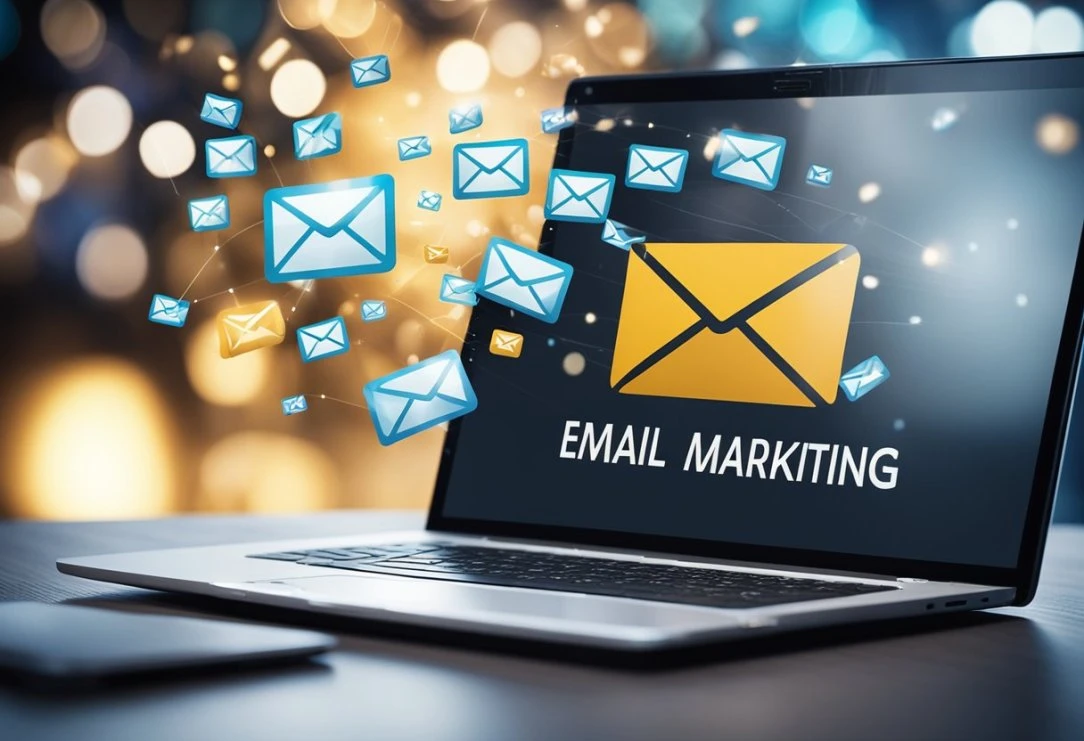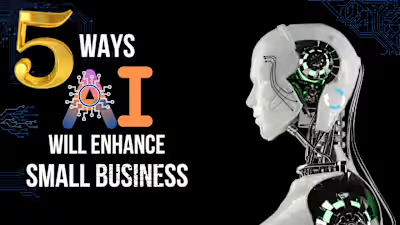AI in Email Marketing: How Artificial Intelligence is Revolutio…
AI in email marketing is a game-changer for businesses that want to stay ahead of the competition. With the rise of artificial intelligence, email marketing has become more personalized, automated, and effective. AI helps marketers to analyze data, automate tasks, and create personalized content for subscribers.

The Importance of AI in Email Marketing cannot be overstated. AI-powered email marketing tools use data to help you optimize your email strategy, automation to help you save time on repetitive tasks, and generative AI to help you create email content. AI helps email teams understand what kind of email to send, to whom, when, and how often. AI-powered email marketing platforms can help you deliver the right message to the right person at the right time, leading to higher engagement rates, more conversions, and increased revenue.
AI and Email Marketing Automation go hand in hand. AI-powered email marketing automation can help you save time and increase efficiency by automating repetitive tasks like triggering an email workflow. AI-powered automation can also help you segment your email list, personalize your email content, and optimize your email campaigns for better results. With AI-powered automation, you can create a seamless customer journey that leads to higher engagement rates and more conversions.
Key Takeaways
AI is a game-changer for email marketing, helping businesses to create personalized, automated, and effective campaigns.
AI-powered email marketing platforms use data to optimize email strategy, automation to save time on repetitive tasks, and generative AI to create email content.
AI-powered email marketing automation can help you save time, increase efficiency, and create a seamless customer journey that leads to higher engagement rates and more conversions.
The Importance of AI in Email Marketing

As a marketer, you know that email marketing is a powerful tool for reaching and engaging with your audience. However, with the increasing volume of emails being sent every day, it can be challenging to stand out in your subscribers’ inboxes. This is where AI comes in.
AI has the power to help email marketers write copy, create imagery, provide hyper-personalization, and create automations. By using AI-powered tools, you can optimize your email campaigns for maximum efficiency and ROI.
One of the most significant benefits of using AI in email marketing is that it saves time while improving performance. Routine processes that you spend time on can happen instantly, and you can launch your optimized campaigns faster. This means you can focus on other critical tasks, such as analyzing data and developing new strategies.
AI also helps marketers to personalize their emails at scale. By analyzing data on your subscribers’ behavior and preferences, AI-powered tools can suggest personalized content, subject lines, and calls to action to increase engagement and conversions.
Another way AI can improve email marketing is by automating tasks such as list segmentation and A/B testing. This allows you to better target your audience and optimize your campaigns for maximum efficiency.
In conclusion, AI is becoming increasingly important in email marketing. By using AI-powered tools, you can save time, increase efficiency, and improve ROI. With the right approach, AI can help you stand out in your subscribers’ inboxes and build stronger relationships with your audience.
AI and Email Marketing Automation
Email marketing automation is the process of using software tools to automate email marketing campaigns. AI-powered tools are being deployed by brands to automate and enhance their email marketing campaigns. AI email marketing automation refers to using AI-powered tools and algorithms to streamline and optimize various processes involved in email marketing campaigns.
AI-powered email marketing automation can help you to:
Save time by automating repetitive tasks.
Increase the relevance of your emails by personalizing them.
Optimize your email campaigns by analyzing data and making data-driven decisions.
Improve the effectiveness of your email campaigns by sending emails at the right time to the right people.
AI-powered email marketing automation can help you to create automated email workflows that send targeted emails to your subscribers based on their behavior, preferences, and interests. AI can also help you to optimize your email campaigns by analyzing data and making data-driven decisions.
By integrating AI technology into your email marketing campaigns, you can improve the effectiveness of your email campaigns by sending emails that are more relevant to your subscribers. You can also save time and resources by automating repetitive tasks.
Machine learning algorithms can be used to analyze data and make data-driven decisions about when to send emails, what content to include in emails, and who to send emails to. By using machine learning algorithms, you can optimize your email campaigns to achieve better results.
In conclusion, AI-powered email marketing automation can help you to save time, increase the relevance of your emails, optimize your email campaigns, and improve the effectiveness of your email campaigns. By integrating AI technology into your email marketing campaigns, you can achieve better results and improve the ROI of your email marketing campaigns.
AI Tools for Email Marketing
If you’re looking to improve your email marketing strategy, consider using AI-powered tools. These tools can help you optimize your campaigns, save time on repetitive tasks, and create more engaging content. Here are some of the top AI tools for email marketing:
HubSpot
HubSpot’s AI email writer is a machine-learning-powered tool that can help you come up with engaging subject lines, draft prospecting emails, generate marketing messaging, and more. This tool uses artificial intelligence to automate part of the email copywriting process, making it easier and faster to create effective emails.
Mailchimp
Mailchimp’s AI-powered features include predictive insights, which use machine learning to analyze your data and provide personalized recommendations for your next campaign. The platform also offers product recommendations, which use data to suggest products to include in your emails based on each subscriber’s purchase history.
SendGrid’s AI-powered features include email optimization, which uses machine learning to analyze your email content and suggest changes to improve engagement. The platform also offers automated email testing, which uses data to test different variations of your emails and determine which ones perform best.
Drift
Drift’s AI-powered features include chatbots, which use natural language processing to provide personalized conversations with your subscribers. The platform also offers email personalization, which uses data to personalize your emails based on each subscriber’s behavior and preferences.
ActiveCampaign’s AI-powered features include predictive sending, which uses machine learning to determine the best time to send each email based on each subscriber’s behavior. The platform also offers conditional content, which uses data to show different content to different subscribers based on their behavior and preferences.
Omnisend
Omnisend’s AI-powered features include automation workflows, which use machine learning to trigger personalized emails based on each subscriber’s behavior. The platform also offers segmentation, which uses data to group subscribers based on their behavior and preferences, making it easier to send targeted emails.
Twilio SendGrid
Twilio SendGrid’s AI-powered features include email optimization, which uses machine learning to analyze your email content and suggest changes to improve engagement. The platform also offers automated email testing, which uses data to test different variations of your emails and determine which ones perform best.
Optimove
Optimove’s AI-powered features include predictive segmentation, which uses machine learning to group subscribers based on their predicted behavior and preferences. The platform also offers personalized messaging, which uses data to personalize your emails based on each subscriber’s behavior and preferences.
Overall, using AI-powered tools for email marketing can help you save time, improve engagement, and increase conversions. Consider incorporating these tools into your email marketing strategy to take your campaigns to the next level.
AI in Creating Email Subject Lines
Email subject lines are one of the most important factors that determine whether or not a recipient will open your email. With the help of AI, marketers can create subject lines that are more personalized, engaging, and effective. In this section, we will discuss how AI is used in creating email subject lines.
Personalization of Email Subject Lines
Personalization is key to creating effective email subject lines. With AI, you can personalize subject lines based on a recipient’s name, location, preferences, and behavior. For example, you can use AI to analyze a recipient’s past behavior and preferences to create subject lines that are more relevant to them. This can increase the chances of the recipient opening the email and engaging with your content.
AI in A/B Testing of Subject Lines
A/B testing is a common practice in email marketing where two different subject lines are tested to see which one performs better. With AI, you can automate the A/B testing process and get data-driven insights into which subject lines are more effective. AI can also analyze customer behavior and preferences to create subject lines that are more likely to resonate with them.
Using AI in A/B testing can save marketers time and resources while improving the effectiveness of their email campaigns. By analyzing data and customer behavior, AI can help marketers create subject lines that are more engaging and personalized.
In conclusion, AI is a powerful tool for creating effective email subject lines. By leveraging data analysis and predictive analytics, marketers can create subject lines that are more personalized, engaging, and effective. With the help of AI, marketers can improve the performance of their email campaigns and drive more conversions.
AI in Email List Management
Managing your email list can be a daunting task, especially when you have a large number of subscribers. However, with the help of AI, email list management has become more efficient and effective. In this section, we will explore how AI is being used in email list management with a focus on email validation, segmentation, and targeting.
AI in Email Validation
Email validation is the process of verifying the accuracy and validity of email addresses on your list. AI-powered email validation tools can help you identify and remove invalid email addresses, which can improve your email deliverability and reduce bounce rates.
One such tool is Brevo, which uses AI to validate email addresses in real-time. It checks the syntax, domain, and mailbox of each email address to ensure that it is valid. Brevo also provides a score for each email address, which indicates the likelihood that it is valid. This score can be used to segment your email list and target your most engaged subscribers.
AI in Segmentation and Targeting
Segmentation and targeting are essential components of email marketing. By segmenting your email list, you can send targeted messages to specific groups of subscribers based on their interests, preferences, and behavior.
AI-powered segmentation tools can help you identify patterns in your data and create segments based on customer behavior and interests. For example, Omnisend uses AI to analyze customer behavior and predict which products they are most likely to purchase. It then creates segments based on these predictions, allowing you to send targeted messages to customers who are most likely to convert.
In addition to segmentation, AI can also be used for targeting. Twilio SendGrid, for example, uses AI to optimize the timing and content of your emails based on customer behavior. It analyzes open and click rates to determine the best time to send your emails and suggests content that is most likely to resonate with your subscribers.
In conclusion, AI has revolutionized email list management by making it more efficient and effective. By using AI-powered tools for email validation, segmentation, and targeting, you can improve your email deliverability, reduce bounce rates, and send targeted messages to your most engaged subscribers.
AI in Email Content Creation
Email content creation is a crucial aspect of email marketing. It is important to create content that is engaging, relevant, and personalized to the recipient. With the help of AI technology, email marketers can generate email content that is tailored to the specific needs of their subscribers.
AI in Personalizing Email Content
Personalization is a key factor in email marketing. AI technology can analyze user behavior, such as open rates, click-through rates, and purchase history, to generate personalized content. This can include product recommendations, personalized offers, and targeted messaging.
AI can also help to personalize the subject line and preheader text of an email. By analyzing user behavior, AI can determine the most effective subject line and preheader text to increase open rates.
AI in Generating Email Images
Images are an important part of email content. They can help to grab the reader’s attention and convey information in a visually appealing way. AI technology can generate images for email content using image generators.
Image generators use neural protection to analyze user behavior and create images that are tailored to the specific needs of the recipient. This can include product images, personalized graphics, and targeted messaging.
In conclusion, AI technology can be a valuable tool for email marketers looking to create engaging, relevant, and personalized email content. By analyzing user behavior and generating personalized content and images, AI can help to increase open rates, click-through rates, and conversions.
AI in Email Marketing Strategy and Performance
Artificial Intelligence (AI) is transforming the way businesses approach email marketing. AI-powered email marketing strategies can help you optimize your email performance, improve your KPIs, and make data-driven decisions that align with your marketing goals. In this section, we’ll explore how AI is being used to optimize email performance and enhance email marketing strategy.
AI in Optimizing Email Performance
AI can help you optimize your email performance by analyzing data from past campaigns and using that data to improve future campaigns. For example, AI-powered tools can analyze open rates, click-through rates, and conversion rates to identify patterns and trends that can help you improve your email content and targeting.
AI can also help you personalize your emails by analyzing customer data and behavior to create more targeted and relevant content. By using AI to segment your audience and deliver personalized content, you can improve engagement and drive more conversions.
AI in Email Marketing Strategy
AI can help you make data-driven decisions that align with your marketing goals. By analyzing data from past campaigns and customer behavior, AI-powered tools can help you identify the best times to send emails, the most effective subject lines, and the most engaging content.
AI can also help you optimize your email marketing strategy by analyzing big data sets and identifying patterns and trends that can inform your decision-making. By using AI to analyze data from multiple sources, you can gain a more comprehensive understanding of your audience and their behavior, which can help you create more effective email marketing campaigns.
In conclusion, AI is transforming email marketing by providing businesses with the tools they need to optimize their email performance and enhance their email marketing strategy. By leveraging the power of AI-based email marketing, you can make data-driven decisions that align with your marketing goals and drive more conversions.
AI in Email Marketing Campaigns
As an email marketer, you know that creating successful campaigns can be a challenging task. However, with the help of AI, you can make this process a lot easier. AI can help you personalize your marketing campaigns and predict their success. In this section, we will discuss how AI can help you in your email marketing campaigns.
AI in Personalizing Marketing Campaigns
Personalization is a crucial aspect of email marketing. It can help you improve your open rates, click-through rates, and conversion rates. AI can help you personalize your content by analyzing your subscribers’ behavior and preferences. For instance, AI can analyze your subscribers’ past purchases and browsing history to provide product recommendations that are tailored to their interests. This level of personalization can significantly improve the customer experience and increase the chances of conversion.
AI in Predicting Campaign Success
Predictive analytics is another area where AI can be useful in email marketing. By analyzing your past campaigns’ data, AI can help you predict the success of your future campaigns. For instance, AI can analyze your past open rates, click-through rates, and conversion rates to predict how well your future campaigns will perform. This information can help you make informed decisions about your marketing campaigns and improve your chances of success.
In conclusion, AI has become an essential tool in email marketing. It can help you personalize your content, provide product recommendations, and predict the success of your campaigns. By leveraging the power of AI in your marketing campaigns, you can create successful campaigns that improve your conversion rates, open rates, and click-through rates.
AI Email Marketing Tools and Platforms
If you’re looking to enhance your email marketing campaigns, AI-powered email marketing tools and platforms may be the solution you need. These tools use artificial intelligence and machine learning to automate, optimize, and personalize your email marketing campaigns, leading to better engagement and higher conversion rates.
Features and Integration of AI Email Marketing Tools
AI email marketing tools offer a wide range of features to help you streamline and optimize your email marketing campaigns. These features include:
Automated segmentation: AI-powered tools can segment your email list based on user behavior, demographics, and other factors, allowing you to send more targeted and personalized emails.
Predictive analytics: These tools use machine learning algorithms to analyze user behavior and predict which emails are most likely to convert.
Comprehensive reporting: AI email marketing tools offer detailed reporting and analytics, allowing you to track and analyze the performance of your email campaigns.
API integration: Many AI email marketing tools offer API integration, allowing you to connect with other marketing tools and platforms to streamline your workflow.
Pricing and ROI of AI Email Marketing Tools
AI email marketing tools come in a range of pricing options, from free to enterprise-level solutions. Some tools offer a free trial period, allowing you to test the software before committing to a paid plan.
When considering the ROI of AI email marketing tools, it’s important to consider the efficiency and productivity gains that come with using these tools. With automated segmentation and predictive analytics, you can save time and resources while improving the effectiveness of your email marketing campaigns. Additionally, the comprehensive reporting and analytics offered by these tools can help you identify areas for improvement and optimize your campaigns for better results.
Overall, AI email marketing tools and platforms can be a valuable addition to any email marketing strategy, helping you to automate and optimize your campaigns for better engagement and higher conversion rates.
Conclusion
In conclusion, AI has revolutionized email marketing by allowing marketers to automate and optimize their campaigns. With AI-powered email marketing tools, you can customize your emails, deliver them at optimal times, and improve open and click rates. You can also use AI to analyze customer data and behavior to create more personalized and relevant content.
The advantages of AI in email marketing are clear. It can help you save time and resources, increase revenue, and improve customer engagement. AI-powered email campaigns have an estimated 4,200% return on investment (ROI), which is significantly higher than traditional campaigns.
Looking to the future, AI in email marketing will continue to evolve and become even more sophisticated. As AI technology advances, we can expect to see more advanced predictive analytics, better personalization, and more accurate targeting.
Overall, AI email marketing is a powerful tool that can help you achieve your marketing goals. By leveraging the power of AI, you can create more effective campaigns, increase engagement, and drive revenue growth.
Artificial intelligence (AI) has become an integral part of the marketing world. Its ability to analyze large amounts of data quickly and effectively allows businesses to create more targeted and personalized marketing strategies. The result is more efficient campaigns that better capture the attention of consumers and drive higher conversion rates.

In today’s rapidly changing digital landscape, companies need to stay on top of emerging technologies and adapt to their customers’ evolving preferences. This is where AI comes in, revolutionizing the way marketers gather insights, produce content, and optimize their efforts. By harnessing the power of AI, organizations can have a significant competitive advantage, improve customer experience, and drive growth.
Key Takeaways
AI enhances marketing strategies through data analysis and personalization.
Various applications of AI, such as predictive analytics, help to optimize campaigns and content.
Despite challenges and concerns, AI in marketing is continuously evolving, shaping the future of the industry.
Understanding AI in Marketing

As a marketer, I have seen firsthand how artificial intelligence (AI) has revolutionized the way we approach marketing strategies. In this section, I will discuss the fundamental aspects of AI in marketing, specifically focusing on the technology behind AI and the AI systems that power marketing efforts.
Artificial Intelligence Technology
AI technology consists of advanced machine learning algorithms and data analytics tools that enable computers to learn from and process massive amounts of data. In marketing, AI technologies help analyze customer behavior and preferences, predict trends, and develop personalized content tailored to individual needs. Some examples of AI technologies in marketing include chatbots, targeted advertising, and content generation, as explained by the HubSpot Blog.
One of the main advantages of AI technology is the ability to efficiently analyze large volumes of data, allowing marketers like me to gain valuable insights into our target audiences. This enables us to create more relevant and engaging marketing content, resulting in improved customer experiences and increased conversions.
AI Systems
AI systems refer to the various platforms and tools that harness the power of AI technology to streamline marketing processes. Some examples of AI systems in marketing are:
Customer Data Platforms (CDPs): These platforms collect and analyze customer data, providing actionable insights for creating targeted marketing campaigns.
Marketing Automation tools: AI-powered marketing automation platforms can optimize email campaigns, manage social media accounts, and track customer interactions across multiple channels.
Personalization engines: These AI systems use customer data to deliver personalized content and recommendations, improving customer engagement and overall experience.
By using AI-powered marketing tools, businesses can save time and resources spent on gathering and analyzing data, leading to more effective campaigns and optimized performance, as described in Forbes.
In conclusion, AI technology and AI systems play a crucial role in enhancing marketing strategies and driving success in the ever-changing digital landscape. By leveraging AI, I, as a marketer, can better understand and serve my customers, maximizing the potential of my marketing efforts.
AI Applications in Marketing

Chatbots and Customer Service
In my marketing strategy, I have utilized chatbots for various purposes, such as lead development, customer support, and cross-selling or upselling. These customer service chatbots use AI technologies like natural language processing and machine learning to understand user queries and provide relevant responses. This not only improves customer service quality but also frees up valuable time for my human representatives to focus on more complex tasks.
AI in Email Marketing
I also leverage AI in email marketing to optimize my campaigns. By using AI marketing tools, I can analyze and segment my target audience, personalize content, and schedule emails at the best possible times. This helps me increase open rates, click-through rates, and overall engagement. Machine learning algorithms can also predict which subscribers are most likely to convert, allowing me to focus on nurturing and retaining high-value customers.
For more information on the use of AI in email marketing check out my recent article here.
Content Generation through AI
Generating engaging and relevant content can be challenging and time-consuming. To overcome this, I employ AI-powered content generation tools that utilize natural language processing to create high-quality marketing content in a fraction of the time it would take manually. These tools can generate blog posts, social media updates, and promotional materials tailored to my target audience’s interests and preferences, helping me build a stronger brand presence and maintain a consistent content schedule.
AI in Advertising
Finally, AI plays a crucial role in improving the efficiency of my advertising campaigns. I use machine learning algorithms to analyze vast amounts of data and identify patterns and trends to optimize my ad targeting and bidding strategies. These AI-powered insights help me to allocate my advertising budget more effectively and achieve better results in terms of ROI and brand visibility.
Overall, as a marketer, I have experienced the benefits of incorporating AI technologies in various aspects of my marketing efforts. By utilizing AI, from chatbots to content generation and advertising, I have been able to enhance customer experience, improve campaign performance, and make informed decisions for optimizing my marketing strategy.
AI Marketing Tools and Platforms

Google and Facebook AI
I’ve seen that Google and Facebook AI are continuously developing new tools and technologies for marketers. For instance, Google offers solutions like Google Ads Smart Bidding, which uses machine learning to optimize bids for conversions. Facebook, on the other hand, has been using advanced algorithms to create custom audiences and improve ad targeting for businesses.
E-commerce AI Tools
In the e-commerce sector, AI-driven platforms are becoming essential for retailers to stay ahead in the competition. AI-powered tools can help in enhancing product recommendations, improving search functions, and offering personalized shopping experiences to customers. Additionally, some AI tools analyze customer behavior data to create tailored marketing campaigns, which lead to higher conversions and sales.
Customer Journey Analysis AI
Customer journey analysis AI is crucial for understanding the various touchpoints customers interact with during their journey. AI-powered platforms collect and analyze data from online and offline channels to identify customer pain points, preferences, and opportunities for better engagement. By implementing AI in customer journey analysis, marketers can create more effective marketing strategies to target and convert potential customers.
Salesforce AI
Salesforce AI is a platform that offers various artificial intelligence and machine learning capabilities to enhance CRM workflows, sales, and marketing processes. One popular Salesforce AI feature is Einstein, which analyzes customer data to predict behavior, improve customer engagement, and increase sales. Integrating AI into the Salesforce suite can help businesses grow by better understanding the needs and preferences of their customers.
Personalization and Predictive Analytics

Personalized Content Creation
Incorporating AI in marketing helps create personalized content for various customer segments. This is achieved by analyzing customer insights and preferences to tailor marketing messages according to the individual’s liking. Companies like BCG are exploring the use of AI to create competitive advantage through personalized customer experiences. As a marketing professional, my focus is to ensure that the content we create aligns with our target audience’s preferences, maximizing engagement and conversion rates.
Predicting Customer Behavior
One of the significant benefits of using AI in marketing is its ability to predict customer behavior by analyzing historical data and trends. By leveraging AI’s power for marketing success, businesses can identify patterns and correlations in consumer behavior, enabling them to craft effective marketing strategies. I’ve found that incorporating these predictions into my marketing efforts helps me optimize my campaigns and improve customer targeting. Forbes states that choosing use cases relevant to a business and analyzing the benefits of AI solutions is essential to achieving marketing objectives.
Forecasting Sales and Revenue
Forecasting sales and revenue are key to any business’s success, and AI technology can significantly enhance these efforts. AI-powered marketing tools can help free up capacity for sales professionals, providing more time to connect with prospective customers while reducing costs. According to McKinsey, generative AI can boost sales effectiveness and performance by offloading and automating many mundane sales activities. In my experience, utilizing AI’s forecasting capabilities has allowed me to better understand market trends, customer preferences, and dynamic pricing, which has directly contributed to maximizing ROI.
Impacts of AI in Digital Marketing

As a marketing professional, I’ve witnessed the tremendous impact that AI has had on digital marketing. In this section, I’m going to discuss two major areas where AI has revolutionized the landscape – SEO and influencer marketing.
Revolutionizing SEO
I’ve observed that AI-powered technologies have significantly improved search engine optimization (SEO) practices. For instance, AI helps in better understanding user intent, enabling marketers to optimize keywords and content more effectively. By analyzing massive amounts of data, AI can identify trends and patterns that are nearly impossible for humans to uncover, allowing for better decision-making in SEO strategy.
In my experience, AI has also contributed to marketing automation, streamlining tasks such as keyword research and performance analysis. This allows marketing teams to focus on creating high-quality content and strategies rather than spending countless hours on repetitive tasks. Furthermore, content optimization tools, such as GPT-3 for automated copywriting, have emerged, providing marketers with the ability to produce engaging content with less effort.
Influencer Marketing with AI
AI has also played a significant role in influencer marketing. In my practice, I’ve seen the rise of AI-driven platforms that help brands find the most relevant influencers for their respective campaigns. These platforms analyze influencers’ audience demographics, interests, and engagement levels to ensure that brands collaborate with influencers whose followers align with their target market.
Additionally, AI assists marketers in monitoring and analyzing influencer performance. By evaluating social media data and campaign results, AI helps determine the effectiveness of an influencer marketing partnership. This enables brands to make data-driven decisions when forming collaborations, ensuring that resources are allocated to partnerships delivering the best ROI.
In conclusion, the application of AI in digital marketing has revolutionized the industry by enhancing SEO practices and influencer marketing strategies. Through the use of AI, marketers can optimize their efforts, create more engaging content, and ultimately improve overall marketing results.
Challenges and Concerns

Privacy Concerns
As a marketing professional utilizing AI, I understand that one of the significant challenges is privacy concerns. AI algorithms rely on vast amounts of data to function effectively. The collection and processing of personal information raise questions about data privacy and ethics. With the introduction of privacy laws like GDPR and CCPA, it’s crucial for marketers like me to be mindful of the regulations surrounding data collection and handling.
AI-powered marketing tools may also learn from user behaviors and preferences, raising questions about the extent of personalization. This can lead to discomfort among customers and potential backlash if not approached carefully. Striking the right balance between delivering relevant content and respecting customer privacy remains a challenge that I must confront while using AI in marketing.
Adoption Challenges
Implementing AI into marketing strategies is not without difficulties. Some of the most common adoption challenges I face include the cost of implementation as well as the complexity of the technology. The high upfront costs can make it difficult for small businesses and individuals to adopt AI solutions. Moreover, understanding and integrating AI systems can be complicated, especially for those with limited technical knowledge.
Another obstacle I face in AI adoption is the challenge of ensuring data quality and quantity. AI algorithms are only as good as the data they’re trained on, making it essential for marketers like me to possess robust and accurate data sets to improve the performance of AI systems. Additionally, the overreliance on data-driven insights can sometimes hinder creativity and result in marketing campaigns that lack the human touch.
In conclusion, while AI has the potential to revolutionize marketing strategies, I must be aware of and address the challenges and concerns that come with it. By navigating privacy laws, ensuring data quality, and acknowledging the complexities of AI adoption, I can make the most of AI-driven marketing tools while minimizing the risks and potential pitfalls.
Like this project
Posted Oct 10, 2023
AI in email marketing is a game-changer for businesses that want to stay ahead of the competition. With the rise of artificial intelligence, email marketing ha…





